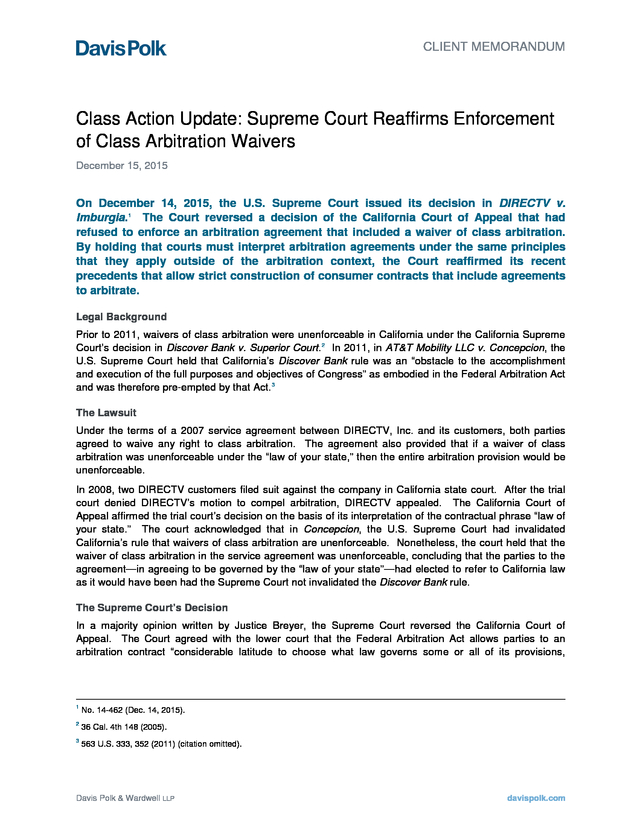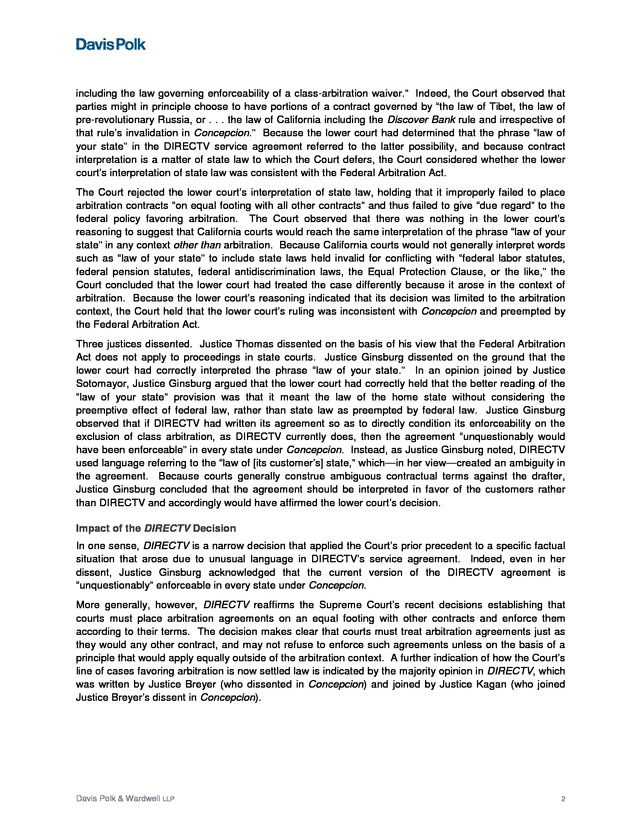Class Action Update: Supreme Court Reaffirms Enforcement of Class Arbitration Waivers - December 15, 2015
Davis Polk & Wardwell
Description
CLIENT MEMORANDUM
Class Action Update: Supreme Court Reaffirms Enforcement
of Class Arbitration Waivers
December 15, 2015
On December 14, 2015, the U.S. Supreme Court issued its decision in DIRECTV v.
Imburgia. 1 The Court reversed a decision of the California Court of Appeal that had
refused to enforce an arbitration agreement that included a waiver of class arbitration.
By holding that courts must interpret arbitration agreements under the same principles
that they apply outside of the arbitration context, the Court reaffirmed its recent
precedents that allow strict construction of consumer contracts that include agreements
to arbitrate.
Legal Background
Prior to 2011, waivers of class arbitration were unenforceable in California under the California Supreme
Court’s decision in Discover Bank v. Superior Court.
2 In 2011, in AT&T Mobility LLC v. Concepcion, the U.S. Supreme Court held that California’s Discover Bank rule was an “obstacle to the accomplishment and execution of the full purposes and objectives of Congress” as embodied in the Federal Arbitration Act and was therefore pre-empted by that Act.
3 The Lawsuit Under the terms of a 2007 service agreement between DIRECTV, Inc. and its customers, both parties agreed to waive any right to class arbitration. The agreement also provided that if a waiver of class arbitration was unenforceable under the “law of your state,” then the entire arbitration provision would be unenforceable. In 2008, two DIRECTV customers filed suit against the company in California state court.
After the trial court denied DIRECTV’s motion to compel arbitration, DIRECTV appealed. The California Court of Appeal affirmed the trial court’s decision on the basis of its interpretation of the contractual phrase “law of your state.” The court acknowledged that in Concepcion, the U.S. Supreme Court had invalidated California’s rule that waivers of class arbitration are unenforceable.
Nonetheless, the court held that the waiver of class arbitration in the service agreement was unenforceable, concluding that the parties to the agreement—in agreeing to be governed by the “law of your state”—had elected to refer to California law as it would have been had the Supreme Court not invalidated the Discover Bank rule. The Supreme Court’s Decision In a majority opinion written by Justice Breyer, the Supreme Court reversed the California Court of Appeal. The Court agreed with the lower court that the Federal Arbitration Act allows parties to an arbitration contract “considerable latitude to choose what law governs some or all of its provisions, 1 No. 14-462 (Dec.
14, 2015). 2 36 Cal. 4th 148 (2005). 3 563 U.S. 333, 352 (2011) (citation omitted). Davis Polk & Wardwell LLP davispolk.com .
including the law governing enforceability of a class-arbitration waiver.” Indeed, the Court observed that parties might in principle choose to have portions of a contract governed by “the law of Tibet, the law of pre-revolutionary Russia, or . . . the law of California including the Discover Bank rule and irrespective of that rule’s invalidation in Concepcion.” Because the lower court had determined that the phrase “law of your state” in the DIRECTV service agreement referred to the latter possibility, and because contract interpretation is a matter of state law to which the Court defers, the Court considered whether the lower court’s interpretation of state law was consistent with the Federal Arbitration Act. The Court rejected the lower court’s interpretation of state law, holding that it improperly failed to place arbitration contracts “on equal footing with all other contracts” and thus failed to give “due regard” to the federal policy favoring arbitration.
The Court observed that there was nothing in the lower court’s reasoning to suggest that California courts would reach the same interpretation of the phrase “law of your state” in any context other than arbitration. Because California courts would not generally interpret words such as “law of your state” to include state laws held invalid for conflicting with “federal labor statutes, federal pension statutes, federal antidiscrimination laws, the Equal Protection Clause, or the like,” the Court concluded that the lower court had treated the case differently because it arose in the context of arbitration. Because the lower court’s reasoning indicated that its decision was limited to the arbitration context, the Court held that the lower court’s ruling was inconsistent with Concepcion and preempted by the Federal Arbitration Act. Three justices dissented.
Justice Thomas dissented on the basis of his view that the Federal Arbitration Act does not apply to proceedings in state courts. Justice Ginsburg dissented on the ground that the lower court had correctly interpreted the phrase “law of your state.” In an opinion joined by Justice Sotomayor, Justice Ginsburg argued that the lower court had correctly held that the better reading of the “law of your state” provision was that it meant the law of the home state without considering the preemptive effect of federal law, rather than state law as preempted by federal law. Justice Ginsburg observed that if DIRECTV had written its agreement so as to directly condition its enforceability on the exclusion of class arbitration, as DIRECTV currently does, then the agreement “unquestionably would have been enforceable” in every state under Concepcion.
Instead, as Justice Ginsburg noted, DIRECTV used language referring to the “law of [its customer’s] state,” which—in her view—created an ambiguity in the agreement. Because courts generally construe ambiguous contractual terms against the drafter, Justice Ginsburg concluded that the agreement should be interpreted in favor of the customers rather than DIRECTV and accordingly would have affirmed the lower court’s decision. Impact of the DIRECTV Decision In one sense, DIRECTV is a narrow decision that applied the Court’s prior precedent to a specific factual situation that arose due to unusual language in DIRECTV’s service agreement. Indeed, even in her dissent, Justice Ginsburg acknowledged that the current version of the DIRECTV agreement is “unquestionably” enforceable in every state under Concepcion. More generally, however, DIRECTV reaffirms the Supreme Court’s recent decisions establishing that courts must place arbitration agreements on an equal footing with other contracts and enforce them according to their terms.
The decision makes clear that courts must treat arbitration agreements just as they would any other contract, and may not refuse to enforce such agreements unless on the basis of a principle that would apply equally outside of the arbitration context. A further indication of how the Court’s line of cases favoring arbitration is now settled law is indicated by the majority opinion in DIRECTV, which was written by Justice Breyer (who dissented in Concepcion) and joined by Justice Kagan (who joined Justice Breyer’s dissent in Concepcion). Davis Polk & Wardwell LLP 2 . If you have any questions regarding the matters covered in this publication, please contact any of the lawyers listed below or your regular Davis Polk contact. Menlo Park Christopher B. Hockett 650 752 2009 chris.hockett@davispolk.com Neal A. Potischman 650 752 2021 neal.potischman@davispolk.com Andrew Yaphe 650 752 2088 andrew.yaphe@davispolk.com Frances E. Bivens 212 450 4935 frances.bivens@davispolk.com Joel M.
Cohen 212 450 4592 joel.cohen@davispolk.com Benjamin S. Kaminetzky 212 450 4259 ben.kaminetzky@davispolk.com Amelia T.R. Starr 212 450 4516 amelia.starr@davispolk.com New York © 2015 Davis Polk & Wardwell LLP | 450 Lexington Avenue | New York, NY 10017 This communication, which we believe may be of interest to our clients and friends of the firm, is for general information only.
It is not a full analysis of the matters presented and should not be relied upon as legal advice. This may be considered attorney advertising in some jurisdictions. Please refer to the firm's privacy policy for further details. Davis Polk & Wardwell LLP 3 .
2 In 2011, in AT&T Mobility LLC v. Concepcion, the U.S. Supreme Court held that California’s Discover Bank rule was an “obstacle to the accomplishment and execution of the full purposes and objectives of Congress” as embodied in the Federal Arbitration Act and was therefore pre-empted by that Act.
3 The Lawsuit Under the terms of a 2007 service agreement between DIRECTV, Inc. and its customers, both parties agreed to waive any right to class arbitration. The agreement also provided that if a waiver of class arbitration was unenforceable under the “law of your state,” then the entire arbitration provision would be unenforceable. In 2008, two DIRECTV customers filed suit against the company in California state court.
After the trial court denied DIRECTV’s motion to compel arbitration, DIRECTV appealed. The California Court of Appeal affirmed the trial court’s decision on the basis of its interpretation of the contractual phrase “law of your state.” The court acknowledged that in Concepcion, the U.S. Supreme Court had invalidated California’s rule that waivers of class arbitration are unenforceable.
Nonetheless, the court held that the waiver of class arbitration in the service agreement was unenforceable, concluding that the parties to the agreement—in agreeing to be governed by the “law of your state”—had elected to refer to California law as it would have been had the Supreme Court not invalidated the Discover Bank rule. The Supreme Court’s Decision In a majority opinion written by Justice Breyer, the Supreme Court reversed the California Court of Appeal. The Court agreed with the lower court that the Federal Arbitration Act allows parties to an arbitration contract “considerable latitude to choose what law governs some or all of its provisions, 1 No. 14-462 (Dec.
14, 2015). 2 36 Cal. 4th 148 (2005). 3 563 U.S. 333, 352 (2011) (citation omitted). Davis Polk & Wardwell LLP davispolk.com .
including the law governing enforceability of a class-arbitration waiver.” Indeed, the Court observed that parties might in principle choose to have portions of a contract governed by “the law of Tibet, the law of pre-revolutionary Russia, or . . . the law of California including the Discover Bank rule and irrespective of that rule’s invalidation in Concepcion.” Because the lower court had determined that the phrase “law of your state” in the DIRECTV service agreement referred to the latter possibility, and because contract interpretation is a matter of state law to which the Court defers, the Court considered whether the lower court’s interpretation of state law was consistent with the Federal Arbitration Act. The Court rejected the lower court’s interpretation of state law, holding that it improperly failed to place arbitration contracts “on equal footing with all other contracts” and thus failed to give “due regard” to the federal policy favoring arbitration.
The Court observed that there was nothing in the lower court’s reasoning to suggest that California courts would reach the same interpretation of the phrase “law of your state” in any context other than arbitration. Because California courts would not generally interpret words such as “law of your state” to include state laws held invalid for conflicting with “federal labor statutes, federal pension statutes, federal antidiscrimination laws, the Equal Protection Clause, or the like,” the Court concluded that the lower court had treated the case differently because it arose in the context of arbitration. Because the lower court’s reasoning indicated that its decision was limited to the arbitration context, the Court held that the lower court’s ruling was inconsistent with Concepcion and preempted by the Federal Arbitration Act. Three justices dissented.
Justice Thomas dissented on the basis of his view that the Federal Arbitration Act does not apply to proceedings in state courts. Justice Ginsburg dissented on the ground that the lower court had correctly interpreted the phrase “law of your state.” In an opinion joined by Justice Sotomayor, Justice Ginsburg argued that the lower court had correctly held that the better reading of the “law of your state” provision was that it meant the law of the home state without considering the preemptive effect of federal law, rather than state law as preempted by federal law. Justice Ginsburg observed that if DIRECTV had written its agreement so as to directly condition its enforceability on the exclusion of class arbitration, as DIRECTV currently does, then the agreement “unquestionably would have been enforceable” in every state under Concepcion.
Instead, as Justice Ginsburg noted, DIRECTV used language referring to the “law of [its customer’s] state,” which—in her view—created an ambiguity in the agreement. Because courts generally construe ambiguous contractual terms against the drafter, Justice Ginsburg concluded that the agreement should be interpreted in favor of the customers rather than DIRECTV and accordingly would have affirmed the lower court’s decision. Impact of the DIRECTV Decision In one sense, DIRECTV is a narrow decision that applied the Court’s prior precedent to a specific factual situation that arose due to unusual language in DIRECTV’s service agreement. Indeed, even in her dissent, Justice Ginsburg acknowledged that the current version of the DIRECTV agreement is “unquestionably” enforceable in every state under Concepcion. More generally, however, DIRECTV reaffirms the Supreme Court’s recent decisions establishing that courts must place arbitration agreements on an equal footing with other contracts and enforce them according to their terms.
The decision makes clear that courts must treat arbitration agreements just as they would any other contract, and may not refuse to enforce such agreements unless on the basis of a principle that would apply equally outside of the arbitration context. A further indication of how the Court’s line of cases favoring arbitration is now settled law is indicated by the majority opinion in DIRECTV, which was written by Justice Breyer (who dissented in Concepcion) and joined by Justice Kagan (who joined Justice Breyer’s dissent in Concepcion). Davis Polk & Wardwell LLP 2 . If you have any questions regarding the matters covered in this publication, please contact any of the lawyers listed below or your regular Davis Polk contact. Menlo Park Christopher B. Hockett 650 752 2009 chris.hockett@davispolk.com Neal A. Potischman 650 752 2021 neal.potischman@davispolk.com Andrew Yaphe 650 752 2088 andrew.yaphe@davispolk.com Frances E. Bivens 212 450 4935 frances.bivens@davispolk.com Joel M.
Cohen 212 450 4592 joel.cohen@davispolk.com Benjamin S. Kaminetzky 212 450 4259 ben.kaminetzky@davispolk.com Amelia T.R. Starr 212 450 4516 amelia.starr@davispolk.com New York © 2015 Davis Polk & Wardwell LLP | 450 Lexington Avenue | New York, NY 10017 This communication, which we believe may be of interest to our clients and friends of the firm, is for general information only.
It is not a full analysis of the matters presented and should not be relied upon as legal advice. This may be considered attorney advertising in some jurisdictions. Please refer to the firm's privacy policy for further details. Davis Polk & Wardwell LLP 3 .















